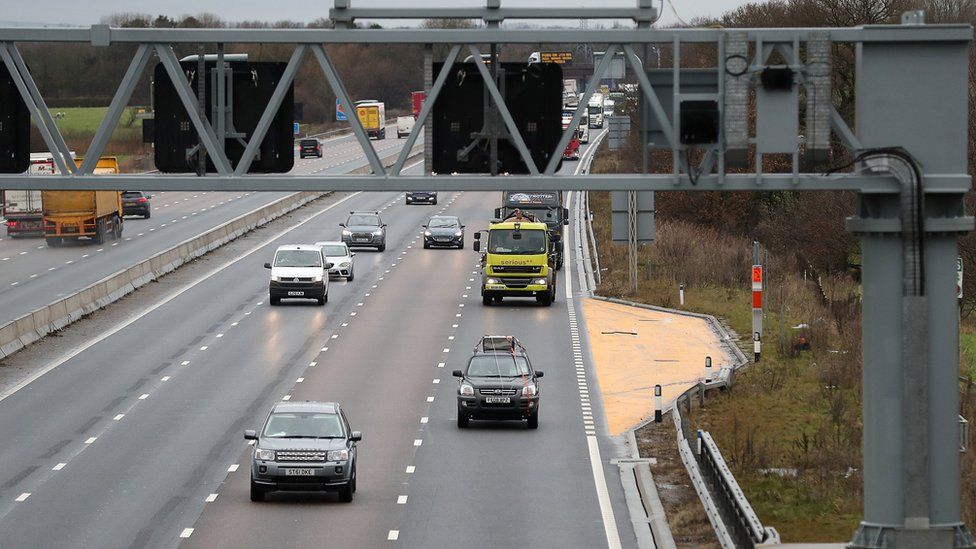ARTICLE AD BOX
 Image source, PA Media
Image source, PA Media
Emergency bays give cars space to pull off the road when there's no hard shoulder
By Katy Austin & Andre Rhoden-Paul
Transport correspondent
Plans for all new smart motorways have been scrapped, it has been announced.
Fourteen smart motorways will be removed from government road-building plans due to a lack of public confidence and financial pressures, the Department for Transport said.
Smart motorways are a stretch of road where technology is used to regulate traffic flow and ease congestion.
They also use the hard shoulder as an extra lane of traffic, which critics claim has led to road deaths.
Prime Minister Rishi Sunak said "all drivers deserve to have confidence in the roads they use to get around the country".
Existing smart motorways - which make up 10% of England's motorway network - will remain but will be undergo a safety refit so there are more emergency stopping places.
But the 14 planned smart motorways - including 11 that had already been paused and three earmarked for construction - will now not be built.
The government said constructing the schemes would have cost more than £1bn, while cancelling them would allow more time to track public confidence in smart motorways over a longer period.
Mr Sunak, who pledged to ban smart motorways during his leadership campaign last year, said: "Many people across the country rely on driving to get to work, to take their children to school and go about their daily lives and I want them to be able to do so with full confidence that the roads they drive on are safe."
Transport Secretary Mark Harper said: "Today's announcement means no new smart motorways will be built, recognising the lack of public confidence felt by drivers and the cost pressures due to inflation."
Smart motorways were developed in order to create more capacity and cut congestion without having to spend extra money and cause disruption by building whole new roads.
However, they have been criticised by MPs and road safety campaigners, including the AA and RAC.
Claire Mercer, whose husband died on a smart motorway in South Yorkshire in 2019, welcomed the move but pledged to continue campaigning for the hard shoulder to return on every road.
Jason Mercer and another man, Alexandru Murgeanu, died when they were hit by a lorry on the M1 near Sheffield after they stopped on the inside lane of the smart motorway following a minor collision.
Mr Mercer's wife Clare Mercer said: "I'm particularly happy that it's been confirmed that the routes that are in planning, in progress, have also been cancelled. I didn't think they'd do that.
"So it's good news, but obviously it's the existing ones that are killing us. And I'm not settling for more emergency refuge areas."
Mrs Mercer's MP, Labour's Sarah Champion for Rotherham, said she was relieved the government had listened to motorists. But she said she wanted to know if schemes currently in construction would be restored and why a ban had taken so long despite a government review and two parliamentary select committee inquiries.
AA president Edmund King said: "We have had enough coroners passing down their deadly and heart-breaking judgments where the lack of a hard shoulder has contributed to deaths.
"At last the government has listened and we are delighted to see the rollout of smart motorways scrapped… We would also like to see the hard shoulder reinstated on existing stretches in due course."
What is a smart motorway?
There are three main types:
- controlled, which have a permanent hard shoulder, but use technology such as variable speed limits to adjust traffic flows
- dynamic, where the hard shoulder can be opened up at peak times and used as an extra lane; when this happens, the speed limit is reduced to 60mph
- all-lane running, where the hard shoulder has been permanently removed to provide an extra lane; emergency refuge areas are provided at regular intervals for cars that get into trouble
All three models use overhead gantries to direct drivers. Variable speed limits are introduced to control traffic flow when there is congestion, or if there is a hazard ahead. These limits are controlled by speed cameras.
Seven of the 14 schemes that have been cancelled were going to involve converting 'dynamic' smart motorways to 'all-lane running' roads where the hard shoulder is permanently removed - but they will now remain dynamic where the hard shoulder can be opened up to be an extra lane at busy times.
Meanwhile, previously announced plans to safety refit existing smart motorways are being progressed so there will be 150 more emergency stopping places across the network, as well as further improved stopped vehicle detection technology.
Construction of two stretches of smart motorway from junctions six to eight on the M56 and from 21a to 26 on the M6 will continue as they are already more than three quarters complete.
The following schemes have been cancelled:
New all lane running smart motorways
Dynamic hard shoulder to all lane running conversions
M4-M5 interchange (M4 junction 19-20 and M5 junction 15-17)
M1 junctions 35A-39 Sheffield to Wakefield
M6 junctions 19- 21A Knutsford to Croft

 1 year ago
98
1 year ago
98








 English (US) ·
English (US) ·